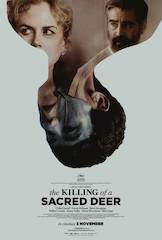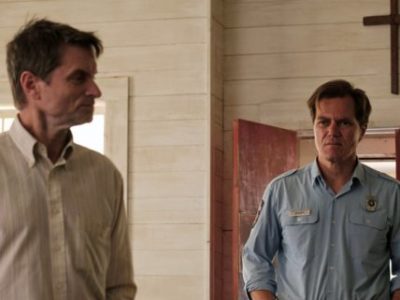Review| The Killing of a Sacred Deer
 Yorgos Lanthimos movies are an acquired taste. Not like black coffee or certain types of seafood or cheese. More like lutefisk, a traditional Norweigan dish that is essential whitefish soaked in lye, or Vegemite (apologies to any of our Australian readers but c’mon). It takes a certain amount of conditioning, brave palate, and iron gut to digest his form of dark, unsettling humor and stomach-turning satirical eye. Unlike body horror or splatter films which aim for gore to upset, Lanthimos chooses psychological nausea. It sticks with you in the most uncomfortable of uncomfortable ways. And frankly, like a Midwest Norweigan loves their gelatinous cod on Christmas Eve, Lanthimos’ latest films have become my acquired taste.
Yorgos Lanthimos movies are an acquired taste. Not like black coffee or certain types of seafood or cheese. More like lutefisk, a traditional Norweigan dish that is essential whitefish soaked in lye, or Vegemite (apologies to any of our Australian readers but c’mon). It takes a certain amount of conditioning, brave palate, and iron gut to digest his form of dark, unsettling humor and stomach-turning satirical eye. Unlike body horror or splatter films which aim for gore to upset, Lanthimos chooses psychological nausea. It sticks with you in the most uncomfortable of uncomfortable ways. And frankly, like a Midwest Norweigan loves their gelatinous cod on Christmas Eve, Lanthimos’ latest films have become my acquired taste.
His latest film, The Killing of a Sacred Deer, is, perhaps, Lanthimos’ most abstract to date. Previous entries like Dogtooth, Alps, and The Lobster cut incisively at modern relationship dynamics. Sacred Deer does, as well, but the angle of the incision is far more acute and recondite than it’s predecessors. Reuniting with Colin Farrell, leading man of Lanthimos’ last feature The Lobster, Farrell plays Steven, a charismatic and well-respected cardiologist with two great kids and a beautiful, equally successful wife played by Nicole Kidman. While it is easy to see in an early dinner scene he connects better with his daughter, Kim, and his wife connects better with their son, Bob, there seems to be real affection and togetherness amongst the family.
However, Steven’s friendship with Martin, a young man he has taken under his wing and played brilliantly by Barry Keoghan, begins to expose the facade of Steven’s seemingly perfect life when their relationship goes from healthy mentorship into a sinister obsession. While the story slowly plays out until the truth is fully unmasked at about the half-way point, Lanthimos ratchets up the unnerving tension with ominous reverberations of piercing strings and an uneasy camera. Whereas previous movies built tension and discomfort with immaculate, static shots and dull, alien-like delivery of lines, Lanthimos’ camera comes in at high angles, often swooping around to follow characters, especially outdoors. The monotone dialogue and pristine set pieces are still there to create a distance between characters and viewers and between other characters, but the psychological effect of these touches add discord to an already unsettling story.
The trouble with this collection of directorial flourishes is they can seem pretentious and cold to the casual viewer and off-putting to the critical eye. As the narrative unfolds, it is difficult to not read the film as purely an exercise in the director’s darker, cynical elements. Even expertly crafted scenes, such as Keoghan’s Martin eating a plate of spaghetti while intimidating Kidman’s Anna or the final scene in the family’s living room, seem pointlessly distressing or needlessly provocative if read this way. However, the title of the movie helps to uncover meaning and deepen appreciation.

The Greek director has cited the tale of Iphigenia, a Greek myth, as inspiration for the movies edifice. The story, in its most succinct form, is about King Agamemnon, of Homer’s Illiad fame, offends the goddess Artemis when he kills a deer in her sacred grove–hence the name of the film. As a consequence, Agamemnon must appease Artemis by sacrificing his eldest daughter, Iphigenia. While varying versions of the story differ in the outcome, the moral core is one of exposing the hubris of Agamemnon, who must decide between his daughter’s life and the success of his armies, Steven being a clear parallel to Agamemnon.
Even more so, Lanthimos’ film shares similarities to the biblical story of Jephthah. In that story, Jephthah makes a rash vow to God to sacrifice to God whatever comes out to meet him when he returns home if God will deliver the Ammonite armies into his hand. When God does so he returns home and his daughter, his only child, came out to meet him. The story in the context of Judges makes sense given the book’s theme of people “[doing] what was right in their own eyes,” and matches Farrell’s Steven. The relative perfection of his family and career mask an extreme vanity and loveless detachment from life and family and make him heartless. A delicious metaphorical touch is his career as a cardiologist, someone who repairs broken hearts. It’s only when confronted with an impossible choice in his own life, a shadowy reflection of a terrible mistake in his own life involving the young Martin, it shows his inability to restore what really matters and succumb to his own hubris and what is right in his own eyes. Lanthimos’ film becomes an uncomfortable elucidation of Greek tragedy and biblical themes of pride and unfaithfulness of mankind.







